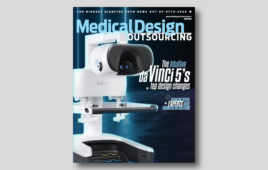
David Neustaedter is Medtronic’s VP of venture investments [Photo courtesy of Medtronic]
He’s spent 14 years in the role, including as director of venture capital at Covidien before Medtronic acquired the company. (Read more in his DeviceTalks speaker bio.)
Medtronic has more than $500 million in venture investments, managed by Neustaedter’s group and others in the company. Every investment handled by his group requires two things.
“The first is we expect top-tier institutional venture returns on investments, and we’ve pulled that off for the last 14 years. So we’re sticking with that,” he said. “And then the second is really strategic fit with Medtronic. The usual form for that is, ‘Is this a company that Medtronic might buy in, say, two to four years?’ ”
About 80% of the time, strategic fit comes down to whether it looks like something that Medtronic already sells. “So that’s typically an existing sales force and the kinds of products that we sell today, whether it’s a tool or an implant, … etc.,” he said.
The other 20% would be investments in areas considered more cutting-edge for Medtronic, he said.
“But we’re not setting strategy for Medtronic,” he said. “We’re really working with our operating units to follow strategy for Medtronic.”
Neustaedter also offered his perspective on Medtronic’s investing philosophy.
“The way we look at it is other people define the success criteria. CMS, FDA, physicians are going to use or implant a particular product. And really what we’re looking for is being able to de-risk, whether a particular company and product are going to meet those hurdles that are externally defined for success,” he said.
“The ugly truth in venture is that it is not about picking a winner. It’s about killing all the losers, right? We can afford a few false negatives,” he said. “If you’re investing in 1% or 2% of the things you see, you’re not going to get everything right, but what you can’t afford is in that 1% or 2% to get a lot of things wrong. We’re looking at trying to use those success criteria as well as possible to eliminate risk when we’re investing in products and companies that are going to improve healthcare.”
He also discussed how the COVID-19 pandemic’s challenges accelerated trends that influence how Medtronic views potential investments.
“Payers, physicians, all the stakeholders that we care about had to become a little more flexible, and some of that flexibility is likely to pass the test of time. So that’s tremendous in that regard,” he said. “I think there are some other challenges that look to persist. For example, we see a lot of staffing issues. It’s really slowing things down. [There’s a] move toward more information captured, whether it’s remotely or acutely and being able to be accessed and the ability, for example, to modulate therapeutic dose or call a patient in early, just like you would a BMW with a loose fan belt these days. And I think there’s a lot more predictive and information capability being added into almost every device that’s implanted and some of the devices that can be used intraoperatively.”








![A photo of the Medtronic GI Genius ColonPro polyp detection system flagging a potential sign of colon cancer during a colonoscopy. [Photo courtesy of Medtronic]](https://www.medicaldesignandoutsourcing.com/wp-content/uploads/2024/04/Medtronic-GI-Genius-doctors-268x170.jpg)